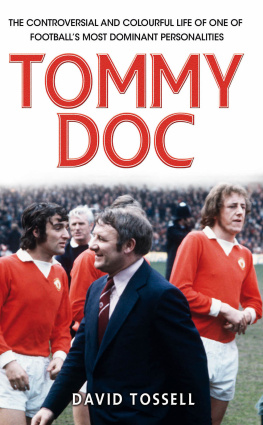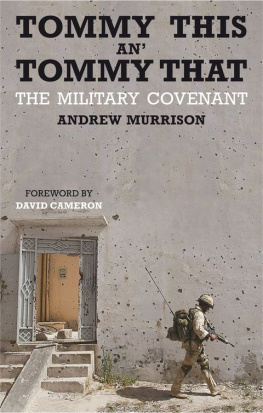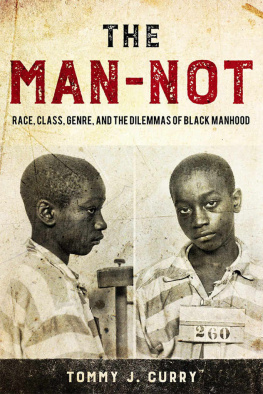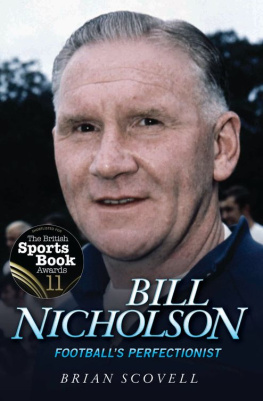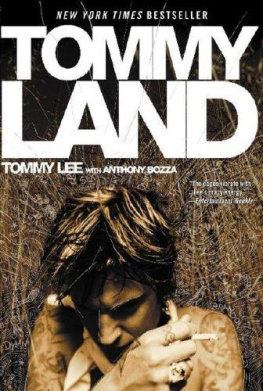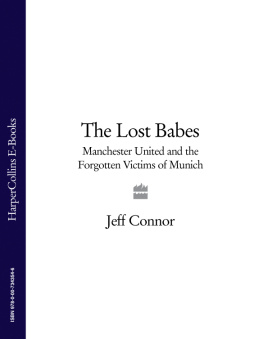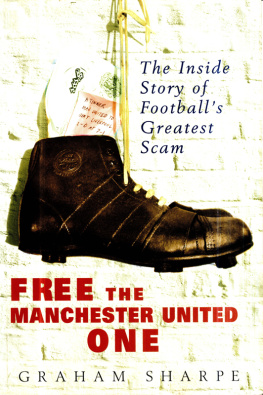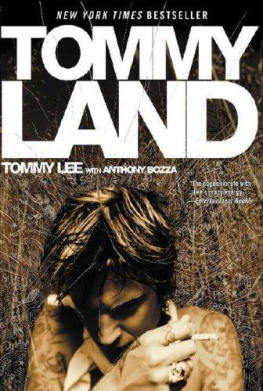CONTENTS
TOMMY DOC
The Controversial and Colourful Life of One of Footballs Most Dominant Personalities
David Tossell

ACKNOWLEDGEMENTS
Piecing together the jigsaw of someones life, even in the instant-research age of the Internet, is impossible without a lot of help. Most importantly, this book has drawn upon interviews with many people, all of whom have my sincere gratitude. The list of those who declined to speak about Tommy Docherty or didnt respond to my requests was, in its own way, almost as revealing. I wont name names, but most readers will be able to work out upon which side of the divide most of the characters in this story sit.
Sadly, one of those I interviewed, Brian Greenhoff, died during the editing stage of this book. I have left his comments in the present tense in order to give a better sense of our conversation.
I have been very lucky that Tommy himself agreed to participate in the project without asking for any control over the end product. For that I have also to thank his wife, Mary, for allowing me to persuade him to be interviewed.
Others who were important to the writing of this book do not appear anywhere except for on the following list: Steve Anglesey, Ted Brack, Stephanie Branston, Garry Bray, David Findlay, Paul Hart, Gary James, Steve Kim, Tom Kundert, Colin Leslie, Tony MacDonald, Paul Mace, Sue McKellar, Jason Morgan, Dermot ORiordan, Nick Pike, Keir Radnedge, Ian Rigby, Richard Smith, Bruce Talbot, Dan Tolhurst, Richard Whitehead and Ed Wyatt. At Press Association Photos, Laura Wagg was as helpful as ever, while David Shopland kindly allowed me to use one of his photographs.
I am grateful to Birlinn for allowing me to use an extract from Michael Grant and Rob Robertsons book The Management. The extract from H. Kingsley-Long and A. McArthurs No Mean City, published by Corgi Books, is reprinted by kind permission of the Random House Group Limited.
It is no exaggeration to say that Bill Campbell at Mainstream Publishing changed my life 12 years ago when he phoned to commission an idea I had pitched to him. Suitably buoyed, I have been writing one book or another ever since and I have been fortunate enough to have worked on several further projects with Bill and his talented team, including Graeme Blaikie, Fiona Brownlee and many others. In thanking them for their support and professionalism with this book, I also have to express my regret that the imminent closure of the company means this will be the final time we work together. I know many other authors are sharing the same sense of loss. I sincerely wish the very best to everyone at Mainstream as they write their own new chapters.
My own family might sometimes wish that I was similarly exiting the publishing world. If so, they do a fantastic job of keeping it to themselves and continuing to offer support and patience. This particular book is dedicated to Amy, Sarah, Laura, Karis and my wife, Sara.
INTRODUCTION
The face, contentedly world-weary, betrays no hint of a smile. The punchlines are delivered with perfect timing, the pause before the pay-off measured immaculately for maximum impact. Les Dawson, the king of the deadpan comedians, couldnt have done this any better. The audience has been warmed up with lines such as growing up in the Gorbals in Glasgow, if you wanted a new pair of shoes you went down to the swimming baths on a Saturday morning and are now roaring their way through a series of clashes with club chairmen and anecdotes about footballs most famous names.
This is Tommy Docherty Tommy Doc to some; to others simply The Doc. Captured on camera during a one-man theatre show in Norwich in the mid-1990s, the figure perched on the centre-stage stool is the embodiment of how many have come to regard one of the sports most vibrant and divisive characters in the years since his managerial career ran out of last chances. A few gags, an avalanche of name-dropping and a checklist of opinions on the modern game when questions are invited from the auditorium. Job done.
Its a well-rehearsed turn and Docherty appears as comfortable in it as when he sits at home on the edge of the Derbyshire Dales in his slippers. Well into his 80s and into the second decade of the new millennium, the act is still getting a regular airing. But this is not Docherty the football man. Its not the driven and ruthless former Scotland international who arrived at two of the biggest clubs in England wielding an axe that sliced through a forest of veteran players, nurturing exciting young teams and transporting Chelsea and Manchester United from the wretched depths of relegation to the elevated rapture of Wembley appearances and title challenges.
The figure on stage is the caricature, the public persona whose jokes, for all the entertainment they offer to folk happy to shell out a few quid, give little insight into the trials and triumphs of a remarkable life. The failures and foul-ups of his managerial career, at places such as Rotherham, Aston Villa and Derby, are merely providers of comedic material. So, too, is the episode when he almost went to prison after admitting to telling lies in court. For many years he even used ladies and gentlemen, youre not going to believe this as the opening line to his speaking engagements. Knowing his public has arrived for gags and giggles, the personal pain of such episodes or analysis of where things went wrong remains hidden behind the one-liners. The stage is no place for self-pity or self-assessment; nor does he use his platform to advance, or even pose, any debate about just how a good a manager he actually was.
To hear the Doc speak about his career now, it all seems like a bit of a joke, says author Jim White in Manchester United: The Biography. To watch him at his prime was to observe a master of the art, charismatic, not fearing of reputation or personal feeling.
Watching the glib, wisecracking character in full flow it is easy to imagine him among the mud and wintergreen, raising spirits when results were going badly and getting a laugh out of players who really didnt fancy training on a cold, wet winter morning. But you dont see the darker side that clearly existed: the jokes that could frequently be laced with venom, leaving rancour-infested dressing-rooms divided along pro- and anti-Docherty lines. The roadside of his life is strewn with the wreckage of relationships with players, employers and even his family, some of whom have not spoken to him for more than three decades.
Chelseas rise under his management in the 1960s was accompanied by the rhythm of players boots clacking down the corridor to his office to hand in transfer requests. Over the years, he fell out with some of the biggest names in football: Terry Venables, George Graham, Barry Bridges, George Best, Denis Law, Willie Morgan, Paddy Crerand, Jim Gregory, Bruce Rioch, Gerry Daly, to name just a few.
Yet rather than destabilising performance on the field, the fact is that the longer Docherty remained at a club Chelsea and Manchester United being the cases in point the more successful his teams became. If that was because he managed over time to get shot of those who failed to respond to his methods, then it is hard to hold that against him, on a purely professional basis at least. Of course, the alternative argument is that perhaps he could have won more than one League Cup, two promotions and an FA Cup had his team environments been more harmonious. Even at the two clubs where he achieved most, his reigns eventually came to an end largely because he had run out of allies when he needed them most.
Next page
